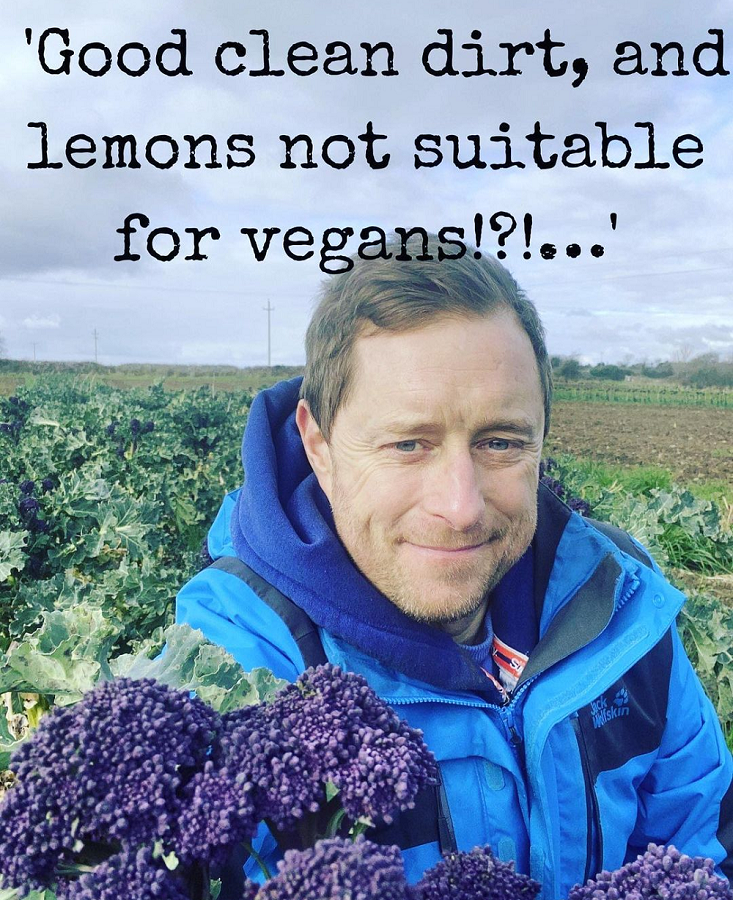When I was a young teenager I used to work every summer for a farmer, he had a saying “there is nothing like good clean dirt!” And in fact, there was a lot of truth in that, even though at the time I had no idea what he was talking about.

A customer contacted us during the week and was concerned about the wasted soil on some of our vegetables that gets washed down the sink, and rightly so. We have thought about this long and hard and totally agree that soil management is critical to healthy food and a healthy planet.
Dirt, clay, soil the stuff that gets stuck under your fingernails is good for us. It is actually pretty healthy to get it on your hands, in fact research has shown that getting your hands stuck in clay may actually ease depression. (Mycobacterium vaccae the bacterium is found in soil and may stimulate serotonin production is currently under study)
Some of our produce comes with dirt on it, we know it takes a little more effort in the kitchen and time can be in short supply, we know when you have a busy household the last thing you want to do is to wash dirty carrots or parsnips.
But here’s the thing we are not hiding anything, you can see the dirt and it has a very important function. It is a natural preservative, it keeps the veg fresh, it keeps the flavour in. You can smell the freshness when you wash one of our dirty parsnips. Crucially leaving dirt on your veg actually helps reduce food waste!
It also avoids an energy intensive and water intensive washing process, and eliminates the need for plastic packaging plus it maintains the nutrient content of the produce
The great thing of course about soil is it can be washed off.
This unfortunately is not the case with chemicals. Many are systemic in nature, (simply put they get inside the plant or food and stay there).
Some chemicals are applied to the skins of fruits and vegetables to preserve them. The most commonly known ones are the fungicides mixed into the waxes and applied to citrus fruit.
It turns out that one of the big supermarkets are now kindly putting the names of the chemicals mixed in with the waxes on their loose citrus fruit on their website. Have a look see for yourself. (Check out the description on loose lemons on this retailer’s website. I’ll give you a hint it is a large multinational supermarket.)
Under Description (and remember this is for Lemons!) it starts by “not suitable for vegans….” Hmm now that is definitely an interesting one.
This is what is found on your conventional (Non organic) LEMONS:
Here is the list we found (Depending on country of origin, the treatment varies)
Spain: Imazalil/Thiabendazole/Pyrimethanil & Wax E914, E904
Morocco: Propiconazole/Pyrimethanil/Imazalil & Wax E914, E904
Egypt: Imazalil/Thiabendazole & Wax E904, E914
Peru: Imazalil/Orthophenylphenol/Thiabendazole & Wax E903, E904
RSA: 2,4 D/Imazalil/Thiabendazole & Wax E914, E904
And here are some fun facts about these hidden gems:
Imazalil is a suspected carcinogen and a probable endocrine disrupter (compounds that mimic or inhibit the body’s hormones, generally not good for us)
Thiabendazole is a probable endocrine disrupter
2,4-D falls into a class of compounds called endocrine-disrupting chemicals.
So, unlike the dirt on our parsnips which is harmless, and could be argued is actually improving our health, extending shelf life, locking in flavour, cutting down on plastic and can be seen, these hidden compounds reside on much of the conventional fruit that is purchased in supermarkets and are bad for our health.
Here’s to good clean dirt!
Kenneth
